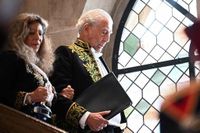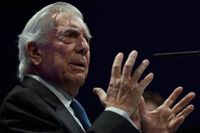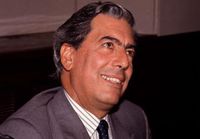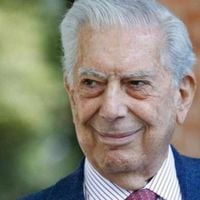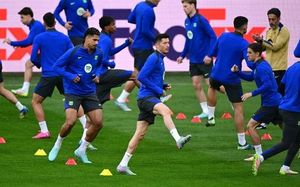Mario Vargas Llosa, the renowned Peruvian writer and Nobel Prize winner in Literature, passed away on Sunday, April 13, 2025, at the age of 89 in Lima. His death was confirmed by his son, Álvaro Vargas Llosa, who shared the news with deep sadness, stating, "We announce with profound sadness that our father, Mario Vargas Llosa, died today in Lima, surrounded by his family and at peace. His departure will sadden his relatives, friends, and readers around the world, but we hope you find comfort, as we do, in the fact that he enjoyed a long, multifaceted, and fruitful life, leaving behind a body of work that will survive him."
The Vargas Llosa family has indicated that there will be no public ceremony, and his remains will be cremated, in accordance with his wishes. This decision reflects the family's desire for privacy during this time of mourning.
Born in Arequipa, Peru, in 1936, Vargas Llosa was a pivotal figure in the Latin American literary boom, alongside contemporaries such as Gabriel García Márquez and Julio Cortázar. His literary career spanned several decades, during which he produced a vast array of works that captivated readers globally. He won numerous prestigious awards, including the Princesa de Astúrias, the Cervantes Prize, and the PEN award, culminating in the Nobel Prize in Literature in 2010.
Vargas Llosa's writing is characterized by a unique blend of fiction and political commentary. One of his most notable works, "A Festa do Bode," published in 2000, explores the dictatorship of Rafael Trujillo in the Dominican Republic. In this novel, Vargas Llosa skillfully intertwines the dictator's story with fictional characters, creating a vivid and disturbing portrait of tyranny and its repercussions. Another significant work is "A Guerra do Fim do Mundo," which showcases his fascination with the Canudos conflict in Brazil.
In addition to his novels, Vargas Llosa was a prolific essayist and journalist, using his voice to advocate for freedom of expression and human rights. Throughout his life, he engaged actively in political debates across Latin America, often supporting candidates who aligned with his views. His political ideology evolved over time; initially aligned with the Cuban Revolution, he distanced himself from leftist politics after the case of Herberto Padilla, a Cuban poet who faced persecution for his criticisms of the regime.
Vargas Llosa's political engagements were not without controversy. He ran for president of Peru in 1990 against Alberto Fujimori, who would later become a dictator. Although he lost the election, Vargas Llosa remained a vocal critic of populist solutions in his country. In recent years, he lent his support to the current president, Dina Boluarte, who has faced challenges to her legitimacy after assuming power from Pedro Castillo.
His literary prowess and political engagement were often intertwined. In his Nobel Prize acceptance speech, Vargas Llosa emphasized the transformative power of literature, stating, "The lies of fiction become truths through the readers." His works often tackled themes of power, resistance, and the complexities of the human condition, resonating with readers across generations.
Vargas Llosa's personal life was as dynamic as his literary career. He married Julia Urquidi in the 1950s, with whom he had two children. Their marriage ended in divorce, and he later married his cousin Patricia Llosa, with whom he had three children. Despite the ups and downs of his relationships, he maintained a vibrant personal life, including a notable affair with socialite Isabel Preysler. In recent years, he had separated from Patricia and lived a single life at the time of his death.
The literary rivalry between Vargas Llosa and García Márquez is one of the most famous in the 20th century. Their friendship began in the 1960s as part of the Latin American literary boom but soured in the 1970s due to personal and political conflicts. Their differing artistic styles—Vargas Llosa's analytical approach versus García Márquez's magical realism—fueled their disputes. The culmination of their rivalry occurred during a public confrontation, which ended their friendship and left a lasting mark on the literary world.
In an interview, Vargas Llosa reflected on their relationship, stating he would no longer discuss García Márquez personally but would continue to praise the significance of his work. This sentiment illustrates the complexity of their relationship, marked by both admiration and rivalry.
As the world mourns the loss of Mario Vargas Llosa, his legacy as a literary giant and a passionate advocate for human rights remains intact. His works will continue to inspire readers and provoke thought on the social and political issues of our time. The impact of his contributions to literature and his unwavering commitment to freedom of expression ensure that his voice will echo through the ages.
